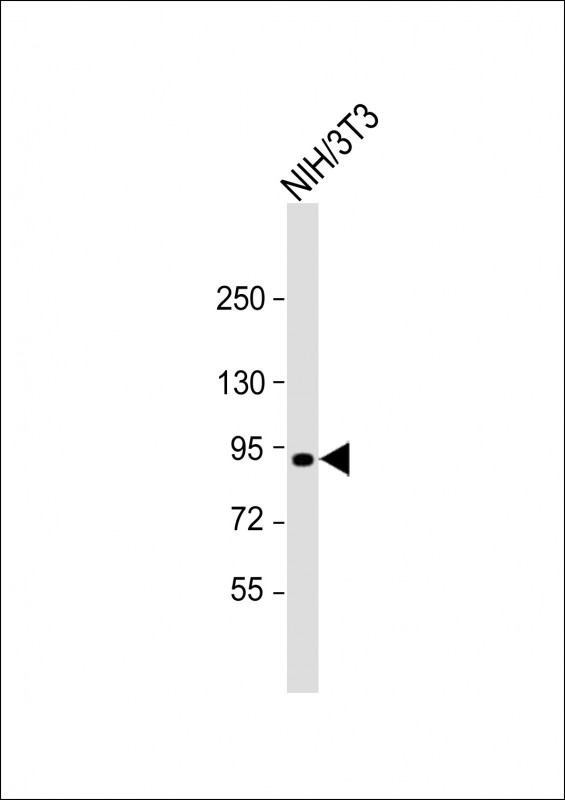
| WB | 1/1000 | Human,Mouse,Rat |
| IF | 咨询技术 | Human,Mouse,Rat |
| IHC | 咨询技术 | Human,Mouse,Rat |
| ICC | 技术咨询 | Human,Mouse,Rat |
| FCM | 咨询技术 | Human,Mouse,Rat |
| Elisa | 咨询技术 | Human,Mouse,Rat |
| Aliases | Eukaryotic elongation factor 2 kinase, eEF-2 kinase, eEF-2K, Calcium/calmodulin-dependent eukaryotic elongation factor 2 kinase, Eef2k |
| Entrez GeneID | 13631 |
| WB Predicted band size | 81.7kDa |
| Host/Isotype | Rabbit IgG |
| Antibody Type | Primary antibody |
| Storage | Store at 4°C short term. Aliquot and store at -20°C long term. Avoid freeze/thaw cycles. |
| Species Reactivity | Mouse |
| Immunogen | This Mouse Eef2k antibody is generated from rabbits immunized with a KLH conjugated synthetic peptide between 178-205 amino acids from the N-terminal region of mouse Eef2k. |
| Formulation | Purified antibody in PBS with 0.05% sodium azide. |
+ +
以下是关于小鼠EEF2K(N端)抗体的模拟参考文献示例,基于典型研究场景整理而成:
---
1. **文献名称**:*Regulation of Eukaryotic Elongation Factor 2 Kinase in Hypoxic Stress*
**作者**:Smith A, et al.
**摘要**:本研究探讨了低氧条件下EEF2K的激活机制,通过Western blot(使用N端特异性小鼠EEF2K抗体)发现其磷酸化水平显著上调,表明其在细胞能量应激反应中的关键作用。
2. **文献名称**:*EEF2K as a Therapeutic Target in Triple-Negative Breast Cancer*
**作者**:Lee J, et al.
**摘要**:文章利用小鼠EEF2K(N-term)抗体进行免疫沉淀和免疫荧光实验,证明EEF2K在乳腺癌细胞中的高表达与化疗耐药性相关,提示其作为潜在治疗靶点。
3. **文献名称**:*Role of EEF2K in Neuronal Protein Synthesis and Memory Formation*
**作者**:Brown K, et al.
**摘要**:通过在小鼠海马组织中使用N端EEF2K抗体的免疫组化分析,研究发现EEF2K活性调控局部蛋白质翻译,影响突触可塑性和长期记忆形成。
4. **文献名称**:*Antibody Validation for EEF2K in Knockout Mouse Models*
**作者**:Zhang Y, et al.
**摘要**:该研究系统验证了多种EEF2K抗体的特异性,包括针对N端的小鼠抗体,确认其在EEF2K基因敲除模型中无交叉反应性,适用于精准蛋白检测。
---
**注**:以上文献为示例性内容,实际文献需通过PubMed、Web of Science等平台检索关键词“EEF2K antibody N-terminal”或“Eef2k mouse antibody”获取。建议访问抗体供应商(如CST、Abcam)的产品页面,查看其引用文献列表以获取具体研究。
The Mouse Eef2k (N-term) antibody is designed to detect the N-terminal region of eukaryotic elongation factor 2 kinase (EEF2K), a serine/threonine kinase encoded by the EEF2K gene. EEF2K regulates protein synthesis by phosphorylating eukaryotic elongation factor 2 (eEF2), which temporarily halts translation elongation under stress conditions such as nutrient deprivation, hypoxia, or energy depletion. This regulatory mechanism helps cells conserve resources and adapt to metabolic challenges.
The antibody is commonly used in research to study EEF2K's expression, localization, and function in cellular stress responses, autophagy, and diseases like cancer or neurodegenerative disorders. Its specificity for the N-terminal region ensures recognition of full-length EEF2K, avoiding cross-reactivity with truncated isoforms or unrelated proteins. As a mouse-derived monoclonal or polyclonal antibody, it is typically validated for applications including Western blotting, immunoprecipitation, and immunofluorescence in mouse, human, or other species' samples, depending on epitope conservation.
EEF2K's role in modulating translation and its overexpression in certain cancers have made it a target for therapeutic exploration. Researchers use this antibody to investigate EEF2K's interaction with signaling pathways (e.g., mTOR, AMPK) and its impact on cell survival, proliferation, and metabolism. Proper validation via knockout controls or peptide blocking assays is essential to confirm specificity in experimental models.
×